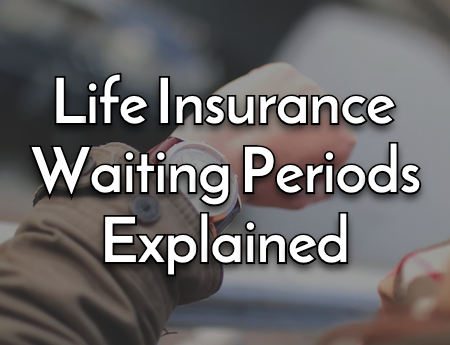When you purchase life insurance, it doesn’t activate right away – there is a waiting period before the coverage takes hold. When you purchase any life insurance policy, it’s important to be aware of the waiting period and understand how it applies to you. Here’s what you need to know about the life insurance waiting period before you purchase your policy.
How Long Is the Waiting Period for Life Insurance Coverage?
 When you purchase a life insurance policy, it does not go into effect immediately. The policy will need to be active and you’ll need to pay the premiums for a certain period of time before the coverage will kick in. Other types of insurance have waiting periods as well – there are typically waiting periods for homeowner’s insurance and even health insurance policies.
When you purchase a life insurance policy, it does not go into effect immediately. The policy will need to be active and you’ll need to pay the premiums for a certain period of time before the coverage will kick in. Other types of insurance have waiting periods as well – there are typically waiting periods for homeowner’s insurance and even health insurance policies.
The waiting period for life insurance can vary depending on the type of policy you have. The standard waiting period for a life insurance policy is two years. However, there are some policies that only require a shorter waiting period or do not require a waiting period at all. These are typically term policies or smaller guaranteed issue policies that are designed to only cover funeral expenses. Alternatively, some policies have waiting periods of longer than two years. These longer waiting periods are typically for policies that have a very high death benefit.
When applying for any life insurance policy, be sure to ask the insurance agent how long the waiting period is, and if there are any exceptions. You’ll also want to confirm this by reviewing your policy once it is issued to you. When you have a thorough understanding of your life insurance policy, you’ll be less likely to encounter problems or confusion later on.
Why Is There a Waiting Period for Life Insurance?
Insurance companies put waiting periods in place in order to prevent insurance fraud. The waiting periods are also an effective way for the insurance company to reduce the financial strain on their operations. By having a waiting period in place, they encourage consumers to purchase a life insurance policy when they are young and healthy. This reduces the number of people who purchase a policy when they have a serious health condition or know they are in their last few years of life.
What Happens If You Pass Away During the Waiting Period?
If your life insurance has a waiting period and you happen to pass away during that time, your family will be refunded all of the premiums you paid during that time. However, your beneficiaries will not receive the death benefit. There may be some exceptions to this rule depending on the cause of death. There are also many companies that will still pay out a death benefit during this time period but will conduct an investigation into your death to make sure that it wasn’t a case of insurance fraud.
This is an important question to ask your insurance agent when you sign up for a policy. You’ll also want to make sure that your beneficiaries understand the waiting period to avoid any unpleasant surprises.
How Do I Get a Policy Without a Waiting Period?
There are many life insurance policies that are available without a waiting period. If you are in good health and you are interested in a policy without a waiting period, you can ask your insurance agent to move up the effective date on your policy. This is the day that life insurance takes hold. If you are considered a relatively low-risk customer, your life insurance company may be willing to move up the effective date.
Another option for those in good health is to look for a fully underwritten policy. These can take time to apply for and are not always available, but there is no waiting period once they are issued. If you are getting a fully underwritten policy, you will need to undergo a health examination and answer questions about your lifestyle. It’s important to be as truthful as possible when applying for this type of life insurance. If you misrepresent yourself, it could result in a loss of coverage.
If you do have a chronic health condition or are at a more advanced age, it will be difficult to get life insurance coverage, but it isn’t impossible. Guaranteed issue life insurance policies are the best option in this case. A guaranteed issue life insurance policy does not require a health exam and goes into effect right away. However, the death benefit is much lower, typically only enough to cover the cost of a funeral.
Keep in mind that there are some exceptions to these immediate issue life insurance policies. Insurance policies put these exemptions in place to protect their finances and reduce the chances of insurance fraud. The most common payout exemption is suicide. However, there are other high-risk activities that can null your insurance payout. These include participating in extreme sports, excessive alcohol use or drug use, and involvement in criminal activity.
Final Word – Life Insurance Waiting Periods
Insurance companies put waiting periods in place for high-value insurance policies in order to prevent insurance fraud. However, there are also plenty of options for those who want to avoid the waiting period. When purchasing any new insurance policy, it is very important to understand how the waiting period works and if there are any exemptions.

